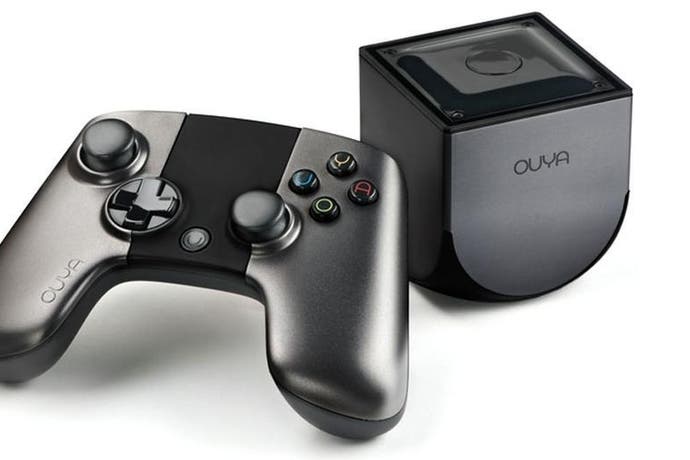Ouya founder Julie Uhrman on the little box that could
Has played Gridiron Thunder and maintains that it's a quality title.
Last year the £100 Android-based video game console Ouya took the crowdfunding world by storm when it raised an incredible $8.6 million. This past spring it finally launched, but so far it's failed to rise above being a curious footnote in a year that's been focused on watching two upcoming gargantuan game consoles vie for the industry's attention.
This need for positive press wasn't helped by Ouya when it let its release date for Kickstarter backers slip, while others received units with faulty controllers. The fledgling company managed to score some goodwill by funding That Dragon, Cancer, Ryan Green's audacious autobiographical story about raising a kid with cancer, but then practically blew it with a tweet advertising the title followed by "GET SOME".
Its image wasn't helped by a leaked prototype ad containing so much vomit it made Ren & Stimpy look like Downton Abbey, and Ouya's latest media blunder was launching its "Free the Games Fund" initiative, which sought to match Kickstarter pledges of Ouya titles one-to-one, so long as they reached $50K. Naturally, this was taken advantage of as all sorts of loopholes were exposed, and the company recently issued a revision to make the program less prone to fraud. Of course, this was after a poorly-received blog post that was supposed to address the issue that ended up dodging it entirely.
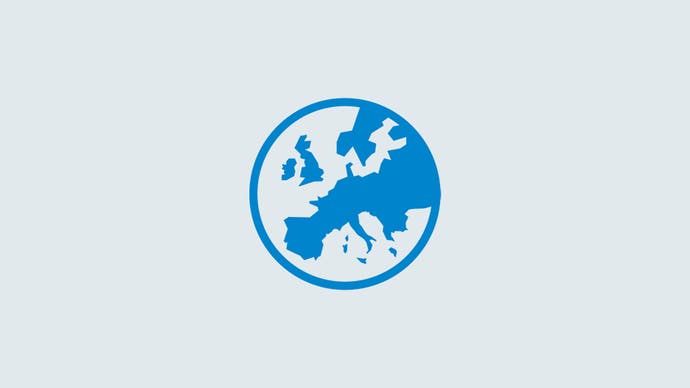
All things considered, it's been a tough time for Ouya. How could it not be, given it's David vs. Goliath stature against its time-honoured competitors? It's a tough position to be in, so I decided to chat with Ouya founder and CEO Julie Uhrman to gain some perspective on some of the trials and tribulations the company's recently faced.
First thing's first: Ouya lost a lot of respect when it announced that it would be honouring its Free the Games Fund offer to a suspicious little American football game called Gridiron Thunder. With only the slightest of prototype footage, the game was somehow funded at $171K, with an average backer donation of $934.48 per person. The developer, MogoTXT, claimed this was from wealthy friends in Silicon Valley and the sports industry, but it still sounded fishy - especially as it was due to come out in only a couple of months. Even though MogoTXT recently pulled out of the promotion, suspicion never ceased. In fact, it may have gotten worse as it was speculated that the developer backed out to avoid getting exposed as fraudulent.
"We saw content after their project was complete and it's looking good." -Julie Uhrman on Gridiron Thunder.
This is hogwash, according to Uhrman. "They didn't do anything wrong," she tells me. In fact, she's played an early build of the game and stands by it. "We saw content after their project was complete and it's looking good."
"They had a large group of friends that believed in them and supported them throughout their Kickstarter campaign. They did much more than they ever anticipated they would do on Kickstarter, blowing away their goal. And as they started developing their game they realised that they could finish it on their own, without the matching funds from us. So they reached out to us and pulled out of the program so the money could be used by other game developers who weren't as fortunate, which I think is unbelievably commendable... We're excited to have it on our platform and maybe find ways to work with them moving forward."
It seems hard to believe, but Uhrman is adamant about this. If she's right and the game ends up being well received, I'm not sure there's a crow big enough for the internet to eat.
While Gridiron Thunder took the brunt of the criticism surrounding the Free the Games Fund, some have criticised how the promotion operates, even with the new restrictions. It doesn't take a rocket scientist to see that developers can still get friends to donate (or give them money to), only to pay them back once they've acquired double the cash via Ouya's offer.
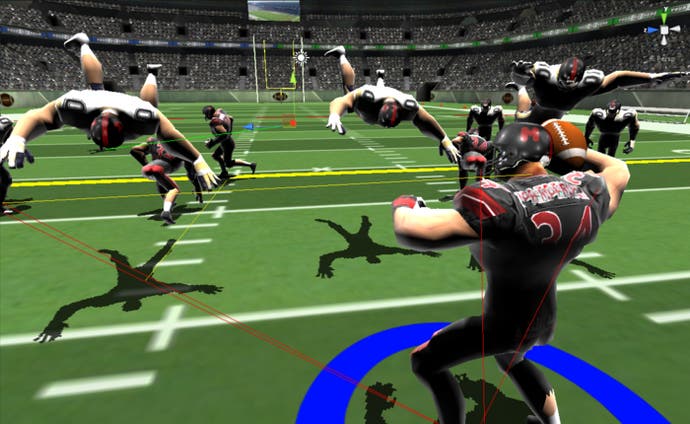
"Well, let's hope that doesn't happen," Uhrman says. "We spent a lot of time developing the program and sometimes you have to launch something to see how people react to it to know if you've done something great. And then you have to spend the time to learn 'if it's not perfect, how do you fix it?' I think some people wanted us to respond quicker than we did, but we wanted to make sure that when we did we got it right."
"We updated the rules to lower the bar for game developers to remove additional incentives like the $100K bonus for the project that raises the most money. We allowed them to bring their games to the PC platform, because a lot of these developers already have an audience there - that's what they told us. We think we've done a lot to make it harder for people to take advantage of the program, but I'm sure there are still ways to do it and we hope that because we've listened to the audience and because we've made these changes that they've specifically asked for, creators and backers will begin to follow the spirit of the program - which is a way to get a community to find great games and bring them to Ouya."
This still doesn't address all the vulnerabilities of the crowdsourced-based fundraiser, but it is much less prone to fraud than before. But why go this pledge-matching route in the first place? Is it that hard for the company to scout around for great content on its own?
"We already do it that way. I think one thing that was unclear with the Free the Games Fund is it's not the only way that we support game developers. We have a team of people on our developer relations team that's led by Kellee Santiago - one of the founders of thatgamecompany that created Journey - and we work with developers on a one to one basis to bring their games to Ouya," Uhrman clarifies.
"If at the end of the day we only get two or three great games from that [the Free the Games fund], that's two or three great games more than we may have found through our traditional path." - Julie Uhrman
"We go out, we go to conferences, we try to find great developers. Developers reach out to us actively and we work with them one on one, but the reality of the situation is we are a small team, and we can only address so many developers and so many games... But if they're willing to take it to the community and see what they think, Free the Games Fund was just another way to find great content. It's not the only way. So if at the end of the day we only get two or three great games from that, that's two or three great games more than we may have found through our traditional path of just going to conferences and talking to devs."
Curious promotion aside, the greater threat towards Ouya is that all three of the next-gen consoles - Wii U, PS4 and Xbox One - allow self-publishing, and already have a built in fanbase. "So why should indies go with you over other consoles," I ask?
"I'm pleased to see them embracing the independent developers. I think it's a great start. But their platforms are still closed and ours is open and I think that that's the reason to support Ouya," she says. "It's a community of people like you that want to see your game on the television."
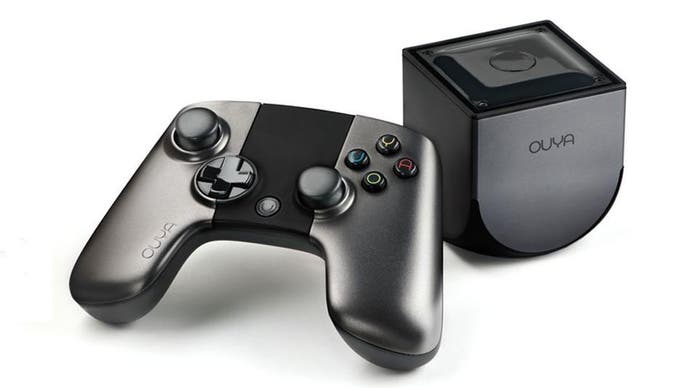
The difference between self-publishing and "openness" might be clear to developers, but for those who don't know how the proverbial hot dogs are made, I ask for clarification. "You don't have to do a business deal with me," she says. "You don't have to buy any expensive development kit, you don't have to have a publisher relationship, you don't have to have shipped a retail game, you don't have to be an established developer. All you have to do is follow some basic content guidelines and your game is live on Ouya. And that same game can go on a number of other platforms."
"But what about the Vita TV? It's also $99, lets you pay portable games on the TV and Sony has an appealing catalogue with a recent focus on indies.
"Until the platform opens up, I'm not afraid of it," - Julie Uhrman on Vita TV.
"Until the platform opens up, I'm not afraid of it," Uhrman confidently replies.
Ouya head of communications Abby Topolsky jumps in to add that Ouya, as a brand, appeals to a different sort of audience and caters more towards indie games and developers. "I think that people come to different platforms for different reasons, and [with] other, larger known consoles in the market, that's not what people have gone to those consoles for traditionally," she explains before noting that Ouya was born a machine that focused first and foremost on independent development. "The indie part is always something we've hung our hat on. I think there's a distinction between that and being something you're trying to get into like Sony or Microsoft."
One benefit of Ouya still being in an embryonic stage is that great games will stick out more on the Android console. "We work closely with developers not only on game development, but to help market and support their games," Uhrman explains. "A number of our developers are on our retail box. They're in retail stores, in our signage, in our kiosks. We create game trailers and videos and we promote them on the console. We work really closely with them because we want their games to become the next big game."
That's all well and good if the company can coax others into joining up, but Ouya has an image problem. After its aforementioned marketing blunders the common perception is that it's a handful of people way out of their league. Uhrman clarifies that it's over 30 people strong, which is still small, but perhaps not as small as some would think.
So what are they doing to instill confidence in your still relatively tiny company?
"We went from an idea to a real functioning product in nine months." - Julie Uhrman
One can practically see Uhrman's eyes light up at this question as an excuse to boast about the company's not insignificant accomplishments. "We went from an idea to a real functioning product in nine months," she says. "We launched a platform with the support of over 8000 developers and 70 games in March. When we hit retail store shelves on June 25th, we had over 170 games and 10,000 developers. We had more games on our platform than any other console at launch. And today we have 24,000 developers, 433 games, and we're getting 30-40 games every single week. This platform is being embraced by developers of all kinds - from independent game developers to triple A game developers. It's getting better every single month as we update our software and improve our hardware and the consumers are coming. We're selling units every single day."
Unfortunately Uhrman doesn't disclose exact figures, but when questioned about unit sales since launch she says, "We're thrilled... We've had great support from retailers. We have distribution in the US, Canada and the UK. We're growing into western Europe and the middle East this year. Things look good."
Clearly Ouya has access to a ton of games, but that's not necessarily a good thing. More content might just mean more crap and the good stuff could get lost in the shuffle. Though as it turns out, Ouya has a really unique algorithm for highlighting content.
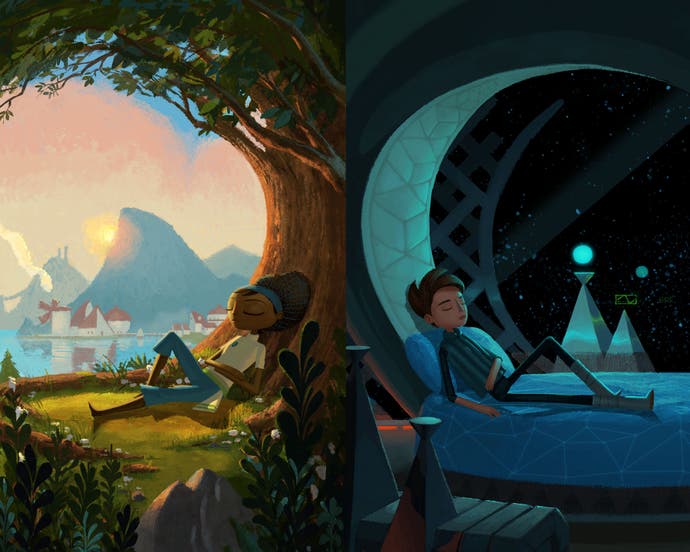
"We look at content discovery very differently from other platforms and even other app stores," says Uhrman. "Traditionally people think about the list of the top games by either revenue or the total number of downloads. Revenue doesn't make sense for Ouya because all the games on Ouya are free to try. And downloads doesn't make sense because you can download a game, play it once, decide you don't like it [and] never play it again, and it's still on the top of the list of download charts if enough people do it. So the way we think about great games on Ouya is we think about how much fun they are to play."
"We look at engagement metrics... The number one game in any channel is the most fun game, as determined by the people who are actually playing the game on the console." - Julie Uhrman
"We look at engagement metrics," Uhrmans explains. "So we look at how many 'likes' it has, was it the first game you played when you booted up Ouya, how many times did you play that game over a certain period of time? We take all these different engagement metrics - an algorithm which we call the O-rank - then we rank all the content, regardless of their category, by their O-rank. So the number one game in any channel is the most fun game, as determined by the people who are actually playing the game on the console."
Games don't start out getting promoted though. They all start out in what Uhrman calls "The Sandbox," which seems like an unintentionally dismal wasteland-esque metaphor for where unpopular games lie. "When a game goes live on Ouya it goes into the sandbox," Uhrman says. "In order for it to get ejected out of the sandbox and discovered in multiple places throughout the storefront, it has to hit that minimum 'fun factor.' So we believe that incentives gamers to play your game and it incentivises developers to to actually promote their games to make sure people know it exists on Ouya."
Another feature Ouya's added to its marketplace is the option to tailor recommendations. "The most recent thing we did was an update last week for Ouya where we allow you to self-curate the storefront. If there's a genre or a game you're just never going to play because it's not your style or type, you can actually move those types of content to the end of the list, so you get new content exposed to you sooner. Also, if you've already downloaded a game we remove that from the list." Unfortunately, it doesn't tailor suggestion for each individual person ala Netflix. It's a universal ranking for everyone.
While Ouya's library of existing games is still largely made up of ports of titles on other consoles, it will be the first console to get Double Fine's highly anticipated adventure Broken Age. Uhrman suggests I ask Double Fine head honcho Tim Schafer about Ouya. Thankfully, Schafer is nearby and willing to comply.
"I was really excited when I saw the Ouya Kickstarter because no consoles were talking about being an open platform for developers," he says. "We were so excited about having an open console because I like console games. I want to make console games. I want to lay on my couch and play games on my TV. I backed it and I have my Ouya, we shipped Dropchord on the Ouya, and Broken Age is going to start out there. It kind of felt like we were siblings in the Kickstarter project world. I'm still really excited to see what they do."
Regarding its less than stellar publicity, Schafer says, "I guess I'm more inclined to give someone the benefit of the doubt just because I've seen with our own experience with Broken Age that well intentioned things can blow up on you and then instantly people get very, very angry. The internet is just quick to explode."
And so continues Ouya's awkward courtship of the industry. Right now it's the well-meaning, socially awkward young bachelor of the game console market, leading one to wonder whether nice consoles finish last, or don't finish at all. Until then Uhrman remains optimistic about Ouya's potential. "We're not the greatest video game console in the world," she says at the end of her presentation at XOXOfest in Portland. "But we could be."
